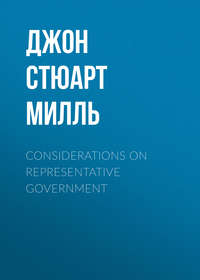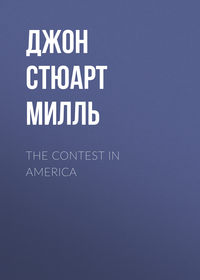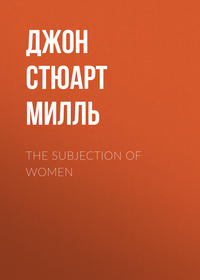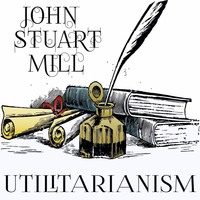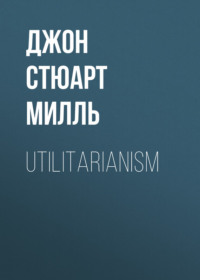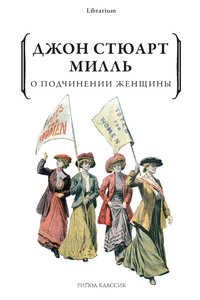 полная версия
полная версияAutobiography
Meanwhile, however, the Review made considerable noise in the world, and gave a recognised status, in the arena of opinion and discussion, to the Benthamic type of Radicalism, out of all proportion to the number of its adherents, and to the personal merits and abilities, at that time, of most of those who could be reckoned among them. It was a time, as is known, of rapidly rising Liberalism. When the fears and animosities accompanying the war with France had been brought to an end, and people had once more a place in their thoughts for home politics, the tide began to set towards reform. The renewed oppression of the Continent by the old reigning families, the countenance apparently given by the English Government to the conspiracy against liberty called the Holy Alliance, and the enormous weight of the national debt and taxation occasioned by so long and costly a war, rendered the government and parliament very unpopular. Radicalism, under the leadership of the Burdetts and Cobbetts, had assumed a character and importance which seriously alarmed the Administration: and their alarm had scarcely been temporarily assuaged by the celebrated Six Acts, when the trial of Queen Caroline roused a still wider and deeper feeling of hatred. Though the outward signs of this hatred passed away with its exciting cause, there arose on all sides a spirit which had never shown itself before, of opposition to abuses in detail. Mr. Hume's persevering scrutiny of the public expenditure, forcing the House of Commons to a division on every objectionable item in the estimates, had begun to tell with great force on public opinion, and had extorted many minor retrenchments from an unwilling administration. Political economy had asserted itself with great vigour in public affairs, by the petition of the merchants of London for free trade, drawn up in 1820 by Mr. Tooke and presented by Mr. Alexander Baring; and by the noble exertions of Ricardo during the few years of his parliamentary life. His writings, following up the impulse given by the Bullion controversy, and followed up in their turn by the expositions and comments of my father and McCulloch (whose writings in the Edinburgh Review during those years were most valuable), had drawn general attention to the subject, making at least partial converts in the Cabinet itself; and Huskisson, supported by Canning, had commenced that gradual demolition of the protective system, which one of their colleagues virtually completed in 1846, though the last vestiges were only swept away by Mr. Gladstone in 1860. Mr. Peel, then Home Secretary, was entering cautiously into the untrodden and peculiarly Benthamic path of Law Reform. At this period, when Liberalism seemed to be becoming the tone of the time, when improvement of institutions was preached from the highest places, and a complete change of the constitution of Parliament was loudly demanded in the lowest, it is not strange that attention should have been roused by the regular appearance in controversy of what seemed a new school of writers, claiming to be the legislators and theorists of this new tendency. The air of strong conviction with which they wrote, when scarcely anyone else seemed to have an equally strong faith in as definite a creed; the boldness with which they tilted against the very front of both the existing political parties; their uncompromising profession of opposition to many of the generally received opinions, and the suspicion they lay under of holding others still more heterodox than they professed; the talent and verve of at least my father's articles, and the appearance of a corps behind him sufficient to carry on a Review; and finally, the fact that the Review was bought and read, made the so-called Bentham school in philosophy and politics fill a greater place in the public mind than it had held before, or has ever again held since other equally earnest schools of thought have arisen in England. As I was in the headquarters of it, knew of what it was composed, and as one of the most active of its very small number, might say without undue assumption, quorum pars magna fui, it belongs to me more than to most others, to give some account of it.
This supposed school, then, had no other existence than what was constituted by the fact, that my father's writings and conversation drew round him a certain number of young men who had already imbibed, or who imbibed from him, a greater or smaller portion of his very decided political and philosophical opinions. The notion that Bentham was surrounded by a band of disciples who received their opinions from his lips, is a fable to which my father did justice in his "Fragment on Mackintosh," and which, to all who knew Mr. Bentham's habits of life and manner of conversation, is simply ridiculous. The influence which Bentham exercised was by his writings. Through them he has produced, and is producing, effects on the condition of mankind, wider and deeper, no doubt, than any which can be attributed to my father. He is a much greater name in history. But my father exercised a far greater personal ascendency. He was sought for the vigour and instructiveness of his conversation, and did use it largely as an instrument for the diffusion of his opinions. I have never known any man who could do such ample justice to his best thoughts in colloquial discussion. His perfect command over his great mental resources, the terseness and expressiveness of his language and the moral earnestness as well as intellectual force of his delivery, made him one of the most striking of all argumentative conversers: and he was full of anecdote, a hearty laugher, and, when with people whom he liked, a most lively and amusing companion. It was not solely, or even chiefly, in diffusing his merely intellectual convictions that his power showed itself: it was still more through the influence of a quality, of which I have only since learnt to appreciate the extreme rarity: that exalted public spirit, and regard above all things to the good of the whole, which warmed into life and activity every germ of similar virtue that existed in the minds he came in contact with: the desire he made them feel for his approbation, the shame at his disapproval; the moral support which his conversation and his very existence gave to those who were aiming at the same objects, and the encouragement he afforded to the fainthearted or desponding among them, by the firm confidence which (though the reverse of sanguine as to the results to be expected in any one particular case) he always felt in the power of reason, the general progress of improvement, and the good which individuals could do by judicious effort.
If was my father's opinions which gave the distinguishing character to the Benthamic or utilitarian propagandism of that time. They fell singly, scattered from him, in many directions, but they flowed from him in a continued stream principally in three channels. One was through me, the only mind directly formed by his instructions, and through whom considerable influence was exercised over various young men, who became, in their turn, propagandists. A second was through some of the Cambridge contemporaries of Charles Austin, who, either initiated by him or under the general mental impulse which he gave, had adopted many opinions allied to those of my father, and some of the more considerable of whom afterwards sought my father's acquaintance and frequented his house. Among these may be mentioned Strutt, afterwards Lord Belper, and the present Lord Romilly, with whose eminent father, Sir Samuel, my father had of old been on terms of friendship. The third channel was that of a younger generation of Cambridge undergraduates, contemporary, not with Austin, but with Eyton Tooke, who were drawn to that estimable person by affinity of opinions, and introduced by him to my father: the most notable of these was Charles Buller. Various other persons individually received and transmitted a considerable amount of my father's influence: for example, Black (as before mentioned) and Fonblanque: most of these, however, we accounted only partial allies; Fonblanque, for instance, was always divergent from us on many important points. But indeed there was by no means complete unanimity among any portion of us, nor had any of us adopted implicitly all my father's opinions. For example, although his Essay on Government was regarded probably by all of us as a masterpiece of political wisdom, our adhesion by no means extended to the paragraph of it in which he maintains that women may, consistently with good government, be excluded from the suffrage, because their interest is the same with that of men. From this doctrine, I, and all those who formed my chosen associates, most positively dissented. It is due to my father to say that he denied having intended to affirm that women should be excluded, any more than men under the age of forty, concerning whom he maintained in the very next paragraph an exactly similar thesis. He was, as he truly said, not discussing whether the suffrage had better be restricted, but only (assuming that it is to be restricted) what is the utmost limit of restriction which does not necessarily involve a sacrifice of the securities for good government. But I thought then, as I have always thought since that the opinion which he acknowledged, no less than that which he disclaimed, is as great an error as any of those against which the Essay was directed; that the interest of women is included in that of men exactly as much as the interest of subjects is included in that of kings, and no more; and that every reason which exists for giving the suffrage to anybody, demands that it should not be withheld from women. This was also the general opinion of the younger proselytes; and it is pleasant to be able to say that Mr. Bentham, on this important point, was wholly on our side.
But though none of us, probably, agreed in every respect with my father, his opinions, as I said before, were the principal element which gave its colour and character to the little group of young men who were the first propagators of what was afterwards called "Philosophic Radicalism." Their mode of thinking was not characterized by Benthamism in any sense which has relation to Bentham as a chief or guide, but rather by a combination of Bentham's point of view with that of the modern political economy, and with the Hartleian metaphysics. Malthus's population principle was quite as much a banner, and point of union among us, as any opinion specially belonging to Bentham. This great doctrine, originally brought forward as an argument against the indefinite improvability of human affairs, we took up with ardent zeal in the contrary sense, as indicating the sole means of realizing that improvability by securing full employment at high wages to the whole labouring population through a voluntary restriction of the increase of their numbers. The other leading characteristics of the creed, which we held in common with my father, may be stated as follows:
In politics, an almost unbounded confidence in the efficacy of two things: representative government, and complete freedom of discussion. So complete was my father's reliance on the influence of reason over the minds of mankind, whenever it is allowed to reach them, that he felt as if all would be gained if the whole population were taught to read, if all sorts of opinions were allowed to be addressed to them by word and in writing, and if by means of the suffrage they could nominate a legislature to give effect to the opinions they adopted. He thought that when the legislature no longer represented a class interest, it would aim at the general interest, honestly and with adequate wisdom; since the people would be sufficiently under the guidance of educated intelligence, to make in general a good choice of persons to represent them, and having done so, to leave to those whom they had chosen a liberal discretion. Accordingly aristocratic rule, the government of the Few in any of its shapes, being in his eyes the only thing which stood between mankind and an administration of their affairs by the best wisdom to be found among them, was the object of his sternest disapprobation, and a democratic suffrage the principal article of his political creed, not on the ground of liberty, Rights of Man, or any of the phrases, more or less significant, by which, up to that time, democracy had usually been defended, but as the most essential of "securities for good government." In this, too, he held fast only to what he deemed essentials; he was comparatively indifferent to monarchical or republican forms – far more so than Bentham, to whom a king, in the character of "corrupter-general," appeared necessarily very noxious. Next to aristocracy, an established church, or corporation of priests, as being by position the great depravers of religion, and interested in opposing the progress of the human mind, was the object of his greatest detestation; though he disliked no clergyman personally who did not deserve it, and was on terms of sincere friendship with several. In ethics his moral feelings were energetic and rigid on all points which he deemed important to human well being, while he was supremely indifferent in opinion (though his indifference did not show itself in personal conduct) to all those doctrines of the common morality, which he thought had no foundation but in asceticism and priestcraft. He looked forward, for example, to a considerable increase of freedom in the relations between the sexes, though without pretending to define exactly what would be, or ought to be, the precise conditions of that freedom. This opinion was connected in him with no sensuality either of a theoretical or of a practical kind. He anticipated, on the contrary, as one of the beneficial effects of increased freedom, that the imagination would no longer dwell upon the physical relation and its adjuncts, and swell this into one of the principal objects of life; a perversion of the imagination and feelings, which he regarded as one of the deepest seated and most pervading evils in the human mind. In psychology, his fundamental doctrine was the formation of all human character by circumstances, through the universal Principle of Association, and the consequent unlimited possibility of improving the moral and intellectual condition of mankind by education. Of all his doctrines none was more important than this, or needs more to be insisted on; unfortunately there is none which is more contradictory to the prevailing tendencies of speculation, both in his time and since.
These various opinions were seized on with youthful fanaticism by the little knot of young men of whom I was one: and we put into them a sectarian spirit, from which, in intention at least, my father was wholly free. What we (or rather a phantom substituted in the place of us) were sometimes, by a ridiculous exaggeration, called by others, namely a "school," some of us for a time really hoped and aspired to be. The French philosophes of the eighteenth century were the examples we sought to imitate, and we hoped to accomplish no less results. No one of the set went to so great excesses in his boyish ambition as I did; which might be shown by many particulars, were it not an useless waste of space and time.
All this, however, is properly only the outside of our existence; or, at least, the intellectual part alone, and no more than one side of that. In attempting to penetrate inward, and give any indication of what we were as human beings, I must be understood as speaking only of myself, of whom alone I can speak from sufficient knowledge; and I do not believe that the picture would suit any of my companions without many and great modifications.
I conceive that the description so often given of a Benthamite, as a mere reasoning machine, though extremely inapplicable to most of those who have been designated by that title, was during two or three years of my life not altogether untrue of me. It was perhaps as applicable to me as it can well be to anyone just entering into life, to whom the common objects of desire must in general have at least the attraction of novelty. There is nothing very extraordinary in this fact: no youth of the age I then was, can be expected to be more than one thing, and this was the thing I happened to be. Ambition and desire of distinction I had in abundance; and zeal for what I thought the good of mankind was my strongest sentiment, mixing with and colouring all others. But my zeal was as yet little else, at that period of my life, than zeal for speculative opinions. It had not its root in genuine benevolence, or sympathy with mankind; though these qualities held their due place in my ethical standard. Nor was it connected with any high enthusiasm for ideal nobleness. Yet of this feeling I was imaginatively very susceptible; but there was at that time an intermission of its natural aliment, poetical culture, while there was a superabundance of the discipline antagonistic to it, that of mere logic and analysis. Add to this that, as already mentioned, my father's teachings tended to the undervaluing of feeling. It was not that he was himself cold-hearted or insensible; I believe it was rather from the contrary quality; he thought that feeling could take care of itself; that there was sure to be enough of it if actions were properly cared about. Offended by the frequency with which, in ethical and philosophical controversy, feeling is made the ultimate reason and justification of conduct, instead of being itself called on for a justification, while, in practice, actions the effect of which on human happiness is mischievous, are defended as being required by feeling, and the character of a person of feeling obtains a credit for desert, which he thought only due to actions, he had a real impatience of attributing praise to feeling, or of any but the most sparing reference to it, either in the estimation of persons or in the discussion of things. In addition to the influence which this characteristic in him had on me and others, we found all the opinions to which we attached most importance, constantly attacked on the ground of feeling. Utility was denounced as cold calculation; political economy as hard-hearted; anti-population doctrines as repulsive to the natural feelings of mankind. We retorted by the word "sentimentality," which, along with "declamation" and "vague generalities," served us as common terms of opprobrium. Although we were generally in the right, as against those who were opposed to us, the effect was that the cultivation of feeling (except the feelings of public and private duty) was not in much esteem among us, and had very little place in the thoughts of most of us, myself in particular. What we principally thought of, was to alter people's opinions; to make them believe according to evidence, and know what was their real interest, which when they once knew, they would, we thought, by the instrument of opinion, enforce a regard to it upon one another. While fully recognising the superior excellence of unselfish benevolence and love of justice, we did not expect the regeneration of mankind from any direct action on those sentiments, but from the effect of educated intellect, enlightening the selfish feelings. Although this last is prodigiously important as a means of improvement in the hands of those who are themselves impelled by nobler principles of action, I do not believe that any one of the survivors of the Benthamites or Utilitarians of that day now relies mainly upon it for the general amendment of human conduct.
From this neglect both in theory and in practice of the cultivation of feeling, naturally resulted, among other things, an undervaluing of poetry, and of Imagination generally, as an element of human nature. It is, or was, part of the popular notion of Benthamites, that they are enemies of poetry: this was partly true of Bentham himself; he used to say that "all poetry is misrepresentation": but in the sense in which he said it, the same might have been said of all impressive speech; of all representation or inculcation more oratorical in its character than a sum in arithmetic. An article of Bingham's in the first number of the Westminster Review, in which he offered as an explanation of something which he disliked in Moore, that "Mr. Moore is a poet, and therefore is not a reasoner," did a good deal to attach the notion of hating poetry to the writers in the Review. But the truth was that many of us were great readers of poetry; Bingham himself had been a writer of it, while as regards me (and the same thing might be said of my father), the correct statement would be, not that I disliked poetry, but that I was theoretically indifferent to it. I disliked any sentiments in poetry which I should have disliked in prose; and that included a great deal. And I was wholly blind to its place in human culture, as a means of educating the feelings. But I was always personally very susceptible to some kinds of it. In the most sectarian period of my Benthamism, I happened to look into Pope's Essay on Man, and, though every opinion in it was contrary to mine, I well remember how powerfully it acted on my imagination. Perhaps at that time poetical composition of any higher type than eloquent discussion in verse, might not have produced a similar effect upon me: at all events I seldom gave it an opportunity. This, however, was a mere passive state. Long before I had enlarged in any considerable degree the basis of my intellectual creed, I had obtained, in the natural course of my mental progress, poetic culture of the most valuable kind, by means of reverential admiration for the lives and characters of heroic persons; especially the heroes of philosophy. The same inspiring effect which so many of the benefactors of mankind have left on record that they had experienced from Plutarch's Lives, was produced on me by Plato's pictures of Socrates, and by some modern biographies, above all by Condorcet's Life of Turgot; a book well calculated to rouse the best sort of enthusiasm, since it contains one of the wisest and noblest of lives, delineated by one of the wisest and noblest of men. The heroic virtue of these glorious representatives of the opinions with which I sympathized, deeply affected me, and I perpetually recurred to them as others do to a favourite poet, when needing to be carried up into the more elevated regions of feeling and thought. I may observe by the way that this book cured me of my sectarian follies. The two or three pages beginning "Il regardait toute secte comme nuisible," and explaining why Turgot always kept himself perfectly distinct from the Encyclopedists, sank deeply into my mind. I left off designating myself and others as Utilitarians, and by the pronoun "we," or any other collective designation, I ceased to afficher sectarianism. My real inward sectarianism I did not get rid of till later, and much more gradually.
About the end of 1824, or beginning of 1825, Mr. Bentham, having lately got back his papers on Evidence from M. Dumont (whose Traité des Preuves Judiciaires, grounded on them, was then first completed and published), resolved to have them printed in the original, and bethought himself of me as capable of preparing them for the press; in the same manner as his Book of Fallacies had been recently edited by Bingham. I gladly undertook this task, and it occupied nearly all my leisure for about a year, exclusive of the time afterwards spent in seeing the five large volumes through the press. Mr. Bentham had begun this treatise three time's, at considerable intervals, each time in a different manner, and each time without reference to the preceding: two of the three times he had gone over nearly the whole subject. These three masses of manuscript it was my business to condense into a single treatise, adopting the one last written as the groundwork, and incorporating with it as much of the two others as it had not completely superseded. I had also to unroll such of Bentham's involved and parenthetical sentences as seemed to overpass by their complexity the measure of what readers were likely to take the pains to understand. It was further Mr. Bentham's particular desire that I should, from myself, endeavour to supply any lacunae which he had left; and at his instance I read, for this purpose, the most authoritative treatises on the English Law of Evidence, and commented on a few of the objectionable points of the English rules, which had escaped Bentham's notice. I also replied to the objections which had been made to some of his doctrines by reviewers of Dumont's book, and added a few supplementary remarks on some of the more abstract parts of the subject, such as the theory of improbability and impossibility. The controversial part of these editorial additions was written in a more assuming tone than became one so young and inexperienced as I was: but indeed I had never contemplated coming forward in my own person; and as an anonymous editor of Bentham I fell into the tone of my author, not thinking it unsuitable to him or to the subject, however it might be so to me. My name as editor was put to the book after it was printed, at Mr. Bentham's positive desire, which I in vain attempted to persuade him to forego.



